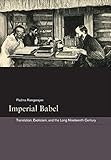Imperial Babel : Translation, Exoticism, and the Long Nineteenth Century / Padma Rangarajan.
Material type: TextPublisher: New York, NY : Fordham University Press, [2014]Copyright date: ©2014Description: 1 online resource (272 p.)Content type:
TextPublisher: New York, NY : Fordham University Press, [2014]Copyright date: ©2014Description: 1 online resource (272 p.)Content type: - 9780823263615
- 9780823263639
- English literature -- History and criticism -- Theory, etc
- Imperialism in literature
- Indic literature -- History and criticism -- Theory, etc
- Translating and interpreting -- Great Britain -- History
- Translating and interpreting -- India -- History
- Asian Studies
- Literary Studies
- Postcolonial Studies
- LITERARY CRITICISM / Semiotics & Theory
- Colonialism
- Exoticism
- India
- Oriental Tale
- Orientalism
- Victorian Literature
- imperialism
- romanticism
- translation
- 418/.020954 23
- online - DeGruyter
| Item type | Current library | Call number | URL | Status | Notes | Barcode | |
|---|---|---|---|---|---|---|---|
 eBook
eBook
|
Biblioteca "Angelicum" Pont. Univ. S.Tommaso d'Aquino Nuvola online | online - DeGruyter (Browse shelf(Opens below)) | Online access | Not for loan (Accesso limitato) | Accesso per gli utenti autorizzati / Access for authorized users | (dgr)9780823263639 |
Browsing Biblioteca "Angelicum" Pont. Univ. S.Tommaso d'Aquino shelves, Shelving location: Nuvola online Close shelf browser (Hides shelf browser)

|

|

|

|

|

|

|
||
| online - DeGruyter Misfit Forms : Paths Not Taken by the British Novel / | online - DeGruyter Lyric Apocalypse : Milton, Marvell, and the Nature of Events / | online - DeGruyter Divine Enjoyment : A Theology of Passion and Exuberance / | online - DeGruyter Imperial Babel : Translation, Exoticism, and the Long Nineteenth Century / | online - DeGruyter Dancing Jacobins : A Venezuelan Genealogy of Latin American Populism / | online - DeGruyter Cultural Techniques : Grids, Filters, Doors, and Other Articulations of the Real / | online - DeGruyter How to Be an Intellectual : Essays on Criticism, Culture, and the University / |
Frontmatter -- contents -- preface -- acknowledgments -- chapter one. Translation’s Trace -- chapter two. Pseudotranslations: Exoticism and the Oriental Tale -- chapter three. Romantic Metanoia: Conversion and Cultural Translation in India -- chapter four. “Paths Too Long Obscure”: The Translations of Jones and Müller -- chapter five. Translation’s Bastards: Mimicry and Linguistic Hybridity -- Conclusion -- notes -- works cited -- index
restricted access online access with authorization star
http://purl.org/coar/access_right/c_16ec
At the heart of every colonial encounter lies an act of translation. Once dismissed as a derivative process, the new cultural turn in translation studies has opened the field to dynamic considerations of the contexts that shape translations and that, in turn, reveal translation’s truer function as a locus of power. In Imperial Babel, Padma Rangarajan explores translation’s complex role in shaping literary and political relationships between India and Britain.Unlike other readings that cast colonial translation as primarily a tool for oppression, Rangarajan’s argues that translation changed both colonizer and colonized and undermined colonial hegemony as much as it abetted it. Imperial Babel explores the diverse political and cultural consequences of a variety of texts, from eighteenth-century oriental tales to mystic poetry of the fin de siecle and from translation proper to its ethnological, mythographic, and religious variants.Searching for translation’s trace enables a broader, more complex understanding of intellectual exchange in imperial culture as well as a more nuanced awareness of the dialectical relationship between colonial policy and nineteenth-century literature. Rangarajan argues that while bearing witness to the violence that underwrites translation in colonial spaces, we should also remain open to the irresolution of translation, its unfixed nature, and its ability to transform both languages in which it works.
Mode of access: Internet via World Wide Web.
In English.
Description based on online resource; title from PDF title page (publisher's Web site, viewed 03. Jan 2023)


